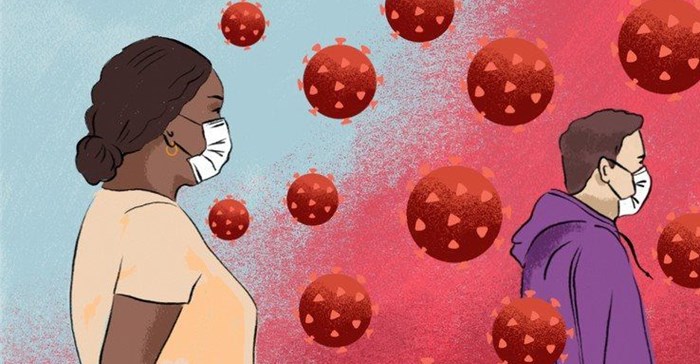Survey estimates half of all adults under 70 have likely had Covid-19

Altogether 16,762 blood donors were tested for antibodies to the virus that causes Covid-19. These antibodies help the body neutralise the effects of SARS-CoV-2 and we have them only if we have been previously infected. The test used does not detect antibodies generated by vaccines.
The authors acknowledge that blood donors are not representative of the population, but regard their estimates as close to the actual population level of SARS-CoV-2 antibody prevalence.
There are striking differences in prevalence between provinces. From highest to lowest, the estimated prevalence per province is:
- Eastern Cape 62.5%
- Kwazulu-Natal 52.1%
- North West 48.5%
- Free State 47.8%
- Mpumalanga 47.6%
- Limpopo 46.3%
- Gauteng 43.8%
- Western Cape 37.4%
- Northern Cape 31.8%
Provinces were sampled primarily either in January for the Eastern Cape, Free State, Northern Cape and KwaZulu-Natal; or in May for Gauteng, Limpopo, Mpumalanga, Northwest, and Western Cape.
Population groups
The study incorporates data from an earlier one published earlier this year for only the four provinces sampled in January. In two provinces, Gauteng and Free State, samples were taken in both months, and from January to May, there was a slight but statistically insignificant relative monthly increase in seroprevalence of 1.6%.
The authors point to the particularly high prevalence in black communities revealing “patterns consistent with known differences in historically entrenched socio-economic status and housing conditions”, and the “urgency of making vaccines available in all communities”.
As in the earlier study, there was a striking difference between races in seroprevalence. Only 10 to 20% of white donors were seroprevalent across all provinces, while more than half of black donors were seroprevalent in all provinces except the sparsely-populated Northern Cape and Limpopo.
Asians in KwaZulu-Natal had higher prevalence than whites, but lower than black Africans, as did Coloured people in the Western Cape. The researchers did not find any significant differences across age or sex.
Need for more surveys
In the US blood seroprevalence surveys are done regularly. This helps the Centers for Disease Control to monitor prevalence and new surges. Such studies are neither difficult nor expensive to conduct and South Africa could usefully do the same.
In fact the authors make it clear they want to do this, writing: “More frequent sampling, including linked repeat observations of frequent donors, could substantially improve the utility of blood donor surveillance.”
This paper has not yet been peer reviewed.
Source: GroundUp

GroundUp is a community news organisation that focuses on social justice stories in vulnerable communities. We want our stories to make a difference.
Go to: http://www.groundup.org.za/



























